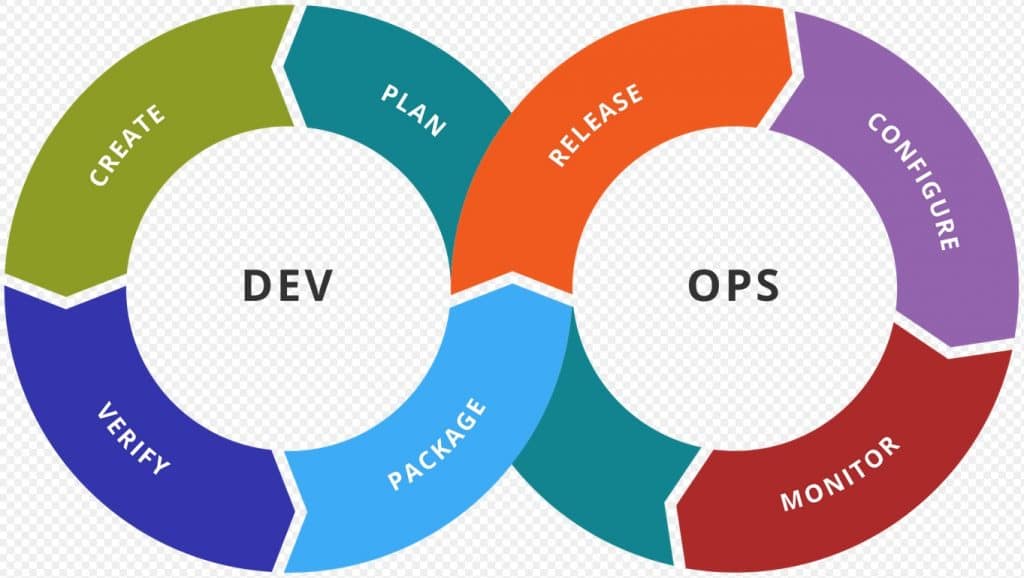Because of the surge in popularity of mobile devices, many industries have developed a mobile app.
In the past, developers didn’t focus on how much money was spent, or what the quality of their code was. Now it’s time to start concentrating on these problems and using new techniques to enhance their code.
We have come up with the following approach to DevOps in mobile app development, as well as its benefits and pitfalls.
What is DevOps?
DevOps is basically an exclusive methodology that focuses on effective cooperation among all the stakeholders who are involved in producing a digital product. This includes staff members, app developers and project managers.
To avoid extra development costs, time, and customer dissatisfaction, DevOps has been introduced as a solution. The approach focuses on optimizing integration of operations and development teams. It also reduces the gap between both teams and mitigates challenges related to continual software development.
DevOps is a culture that promotes deeper integration between teams. It starts with a shift in the state of mind, which changes how teams cooperate.
Automation, quick software releases and dependability are three benefits of DevOps.
With the implementation of DevOps, positive ROI is inevitable. There are many benefits in implementing this model, including the reduction of costs, improved efficiency and more.
Using DevOps, it becomes possible to improve the quality of software and release new software within a shorter time period. The statistics show that 63% of companies using DevOps experienced improvements in their software, while 63% were able to release new software more frequently.
Why is DevOps Important in Mobile App Development?
DevOps is a useful development method to make app creation processes easier. It may be difficult to apply DevOps at first, but when you do it in the right way, it will be highly effective and efficient.
Mobile app development has been plagued with problems due to the use of DevOps. One problem is newer problems, and how to mitigate them in order to continue being a successful mobile application developer.

The Essential 6 C’s of Mobile DevOps
Mainly, there are six elements of the DevOps process. These elements connect the entire procedure and make sure the security and quality of software persist.
Continuous Integration
When writing code for DevOps, it is important to write codes in a way that will merge smoothly with another. Continuous integration emphasizes on working regularly and creating error-free development cycles.
Continuous Planning
Creating a continuous planning software will allow all team members to come to one space and collaborate on the app’s possibilities and resources.
Continuous Monitoring
DevOps lets developers create and monitor applications on their own time with less interaction from other teams.
The development process is steadfast, even when changes occur. Changes happen without any human intervention, so users never have to worry about crashes or poor performance.
Continuous Testing
Continuous testing is an important part of the development lifecycle. It allows developers to find problems with their app and make sure to produce high-quality products.
Continuous Deployment
Continuous deployment is a DevOps standard that releases an automated testing stage code to the production ambiance.
Continuous Delivery
DevOps in mobile apps allows for integrating changes as you go without any delay. You can deploy updates as and when you update your code so productivity is never an issue.
This is a development method touted as delivering quicker and with more frequency.
Difference between DevOps and Agile App Development
Mobile app development is carried out in various ways. Some, like Agile and DevOps are more extensively used. And many companies use one or the other method to create their apps
DevOps and Agile are in fact different things. Let us distinguish how they differ.
- Agile emphasizes short bursts of testing and development. This process breaks down a product into individual pieces, determines the most effective ones based on testing, and combines them for the best output.
- The practice of DevOps helps to streamline the speed of product distribution by making use of integration and increasing the communication between teams. DevOps also makes use of automation so that the procedures are sped up, which in turn helps enhance the speed at which a company provides products or services.
There are more meeting that take place when using Agile, but DevOps is better for identifying gaps in communication.
Agile is a programming methodology that brings agility to development processes. DevOps is a management framework that brings agility to the operations and development processes.
Advantage of DevOps in Mobile App Development
With DevOps, you get top benefits like speed to deployment, reduced time-to-market, and higher quality.
Creates Better Apps
DevOps creates better apps with a better user experience. The user experience is the most essential factor for the accomplishment of any business.
With DevOps, you can release software quicker, remove bugs and errors, and optimize the user experience.
Tests and Monitors Apps Continuously
With so many different versions of an operating system, it is not possible to test all of the versions by manually checking on every gadget. In fact, mobile app developers’ tests are typically done using simulators, not actual devices.
Developer and businesses must use third party SDKs to monitor problems for cause so as to avoid crashes or power shortages.
Maintains The Software Development Process Quality
You can track the evolution of an app and see how it is updated by DevOps, which can help you think about potential changes and will make sure that your app stays at its highest quality.
To read more about this app and to keep up with it, check out the reviews. DevOps helps to solve any bugs or updates that come up for future changes.
DevOps is useful in the software development process. The main thing is that it takes care of different aspects of software development, in terms of being able to consider the entire structure. This helps with better quality and control, having worthwhile monitoring, and also efficient cooperation.
Ignore Process Delays
DevOps helps companies to save time, become more transparent and eliminate delays in the software development process. It also helps create better apps and develop applications faster. It helps you avoid process delays such as:
- Poor communication
- Inconsistencies in workflow
- Manual testing procedure
- Lack of ownership
- Unstable development procedure
Faster Software Release
DevOps saves time spent on product development by implementing a transparent system that makes it easier for the various teams and departments to coordinate. The outcome is a faster release date for the end user.
The use of DevOps ensures that software development meets the needs of your business.
Wrap Up
DevOps is beneficial for mobile app deployment because it facilitates the development of custom applications from start to end. Not only programming language, but DevOps also ensures that your application operates smoothly.
DevOps you can reduce the cost and increase the efficiency of your company. It provides valuable insight into how to develop mobile apps for continued success.



